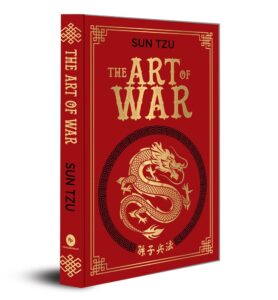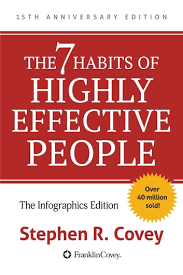Lets explore the top 20 books on wealth and success that offer valuable insights, practical advice and inspiration to help you achieve your goals.
20, “Crush It!: Why NOW Is the Time to Cash In on Your Passion” by Gary Vaynerchuk
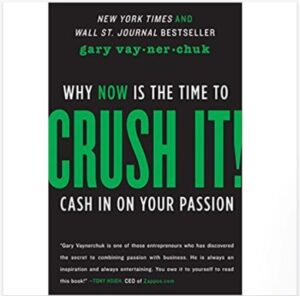
more commonly known by his alias Gary Vaynerchuk or Gary Vee, is an American businessman, author, speaker, and internet personality. He is a co-founder of the restaurant reservation software company Resy and Empathy Wines. First known as a wine critic who expanded his family’s wine business, Vaynerchuk is now more known for his work in digital marketing and social media as the chairman of New York–based communications company VaynerX and as CEO of VaynerX subsidiary VaynerMedia.
In “Crush It!,” Vaynerchuk shares his strategies for turning passion into profit in the digital age. Through practical advice and real-world examples, he shows readers how to leverage social media, personal branding, and hustle to build a successful career doing what they love.
The book shows you how to use the power of the Internet to turn your real interests into real businesses. Gary spent years building his family business from a local wine shop into a national industry leader. Then one day he turned on a video camera, and by using the secrets revealed in this book, transformed his entire life and earning potential by building his personal brand. By the end of this book, any reader will have learned how to harness the power of the Internet to make their entrepreneurial dreams come true. Step by step, Crush It! is the ultimate driver’s manual for modern business.
19, “The Lean Startup” by Eric Ries
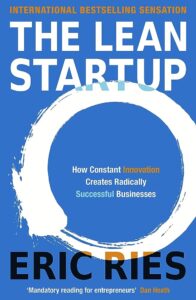
Eric Ries (born September 22, 1978) is an American entrepreneur, blogger, and author of The Lean Start-up, a book on the lean start-up movement. He is also the author of The Start-up Way, a book on modern entrepreneurial management.
In “The Lean Start-up,” Ries introduces the concept of lean methodology for start-ups, emphasizing the importance of rapid experimentation, iterative development, and validated learning. By adopting lean principles, entrepreneurs can minimize waste, maximize efficiency, and increase their chances of success in a competitive market.
The book focuses on How Today’s Entrepreneurs Use Continuous Innovation to Create Radically Successful Businesses is a book by Eric Ries describing his proposed lean start-up strategy for start-up
18, “The Science of Getting Rich” by Wallace D. Wattles
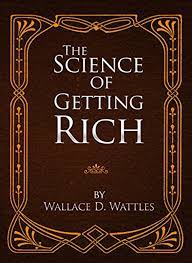
Wallace Delois Wattles Who was born in 1860 and died on 7 February 1911 was an American New Thought writer. He remains personally somewhat obscure, but his writing has been widely quoted and remains in print in the New Thought and self-help movements. The Science of Getting Rich holds the secret to how economic and emotional security can be achieved in a practical, imaginative, and non-competitive way, while maintaining a loving and harmonious relationship with all of life.
By living in accordance with the positive principles outlined in this book, we can find our rightful place in the cosmic scheme and create for ourselves an environment in which to grow in wealth, wisdom, and happiness. First published in 1910, “The Science of Getting Rich” offers timeless wisdom on the principles of wealth-building and success. Wattles’ teachings, from the power of positive thinking to the importance of action, continue to resonate with readers seeking financial.
17, “Good to Great” by Jim Collins
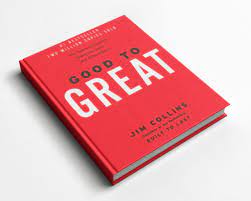
James C. Collins (born 1958) is an American researcher, author, speaker and consultant focused on the subject of business management and company sustainability and growth.
This book describes how companies transition from being good companies to great companies, and how most companies fail to make the transition. The book was a bestseller, selling four million copies and going far beyond the traditional audience of business books. The book was published on October 16, 2001.
In “Good to Great,” Collins explores the factors that separate truly great companies from the rest. Through extensive research and analysis, he identifies key principles for achieving sustained success and offers valuable insights for leaders and entrepreneurs.
16, “The E-Myth Revisited” by Michael E. Gerber
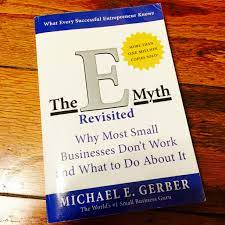
Michael E. Gerber is a true legend of entrepreneurship. Inc. Magazine called him “the World’s #1 Small Business Guru.” He started over 40-plus years ago addressing a significant need in the small business market: businesses owned primarily by people with technical skills but few business skills, and no place to go to get meaningful help.
Over the years, Michael E. Gerber’s companies have helped hundreds of thousands of small business owner-clients to successfully transform their businesses into world-class operations.
In “The E-Myth Revisited,” Gerber explores the myths and misconceptions that prevent many entrepreneurs from achieving success. Through practical advice and case studies, he shows readers how to build a successful business that runs without them, allowing for greater freedom and scalability.
This book tells how to get your business to run without you. It shows how to work on your business, not in it. It explains how to get your people to work without your interference. It tells how to systematize so the business could be replicated 5,000 times. It shows how to do the work you love rather than the work you have to do.
The E-Myth (Entrepreneurial Myth) is that businesses are started by entrepreneurs seeking profit. In actuality, businesses are started by technicians (employees) who decide to work for themselves. The problem is they understand the technical work, not the business itself.
Gerber explains that we’re all composed of 3 personalities. For your business to succeed, you must play each role:
1. The Entrepreneur: a future-focused visionary who pursues opportunities
2. The Manager: a past-focused worrier who plans and organizes
3. The Technician: a present-focused worker who concentrates on the task at hand.
15, “The Art of War” by Sun Tzu
Sun Tzu was a Chinese (771–256 BC). Sun Tzu is traditionally credited as the author of The Art of War, an influential work of military strategy that has affected both Western and East Asian philosophy and military thought.
Sun Tzu is revered in Chinese and East Asian culture as a legendary historical and military figure. His birth name was Sun Wu, While not a traditional book on wealth and success, “The Art of War” offers valuable insights into strategy and leadership that can be applied to business and life. By understanding the principles of warfare, readers can gain a competitive edge in their pursuit of success.
The Art of War is an influential document about tactical warfare written by the ancient Chinese military strategist Sunzi.
14, “The 7 Habits of Highly Effective People” by Stephen R. Covey
Stephen R. Covey is a renowned leadership authority, family expert, teacher, organizational consultant, and co-founder of FranklinCovey Co. He is author of several international bestsellers, including The 7 Habits of Highly Effective People, which has sold over 20 million copies.
He was named one of TIME Magazine’s 25 Most Influential Americans. Dr. Covey holds the Jon M. Huntsman Presidential Chair in Leadership at the Huntsman School of Business at Utah State University.
Regarded as one of the most influential books on personal development, “The 7 Habits of Highly Effective People” offers timeless wisdom on achieving success and fulfillment. Covey’s principles, from proactivity to synergy, provide a roadmap for personal and professional growth.
In this book The 7 Habits of Highly Effective People, author Stephen R. Covey presents a holistic, integrated, principle-centered approach for solving personal and professional problems. With penetrating insights and pointed anecdotes, Covey reveals a step-by-step pathway for living with fairness, integrity, service, and human dignity–principles that give us the security to adapt to change and the wisdom and power to take advantage of the opportunities that change creates.
https://nijenterprise.com/wp-admin/post.php?post=212&action=edit
13, “The One Thing” by Gary Keller
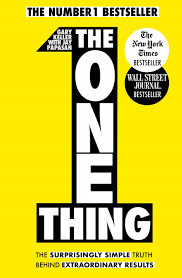
The One Thing: The Surprisingly Simple Truth Behind Extraordinary Results (stylized The ONE Thing) is a non-fiction self-help book written by authors and real estate entrepreneurs Gary W. Keller and Jay Papasan. The book discusses the value of simplifying one’s workload by focusing on the one most important task in any given project.
The book has appeared on the bestseller lists of The New York Times, The Wall Street Journal, USA Today, and Amazon.com. It was first published by Bard Press on April 1, 2013. In “The One Thing,” Keller explores the power of focus and prioritization in achieving extraordinary results. By identifying the one thing that matters most and devoting all your energy to it, readers can unlock their full potential and achieve greater success in less time.
In “The One Thing,” Keller explores the power of focus and prioritization in achieving extraordinary results. By identifying the one thing that matters most and devoting all your energy to it, readers can unlock their full potential and achieve greater success in less time.
Jay Papasan is an American writer and business executive. He is best known for co-authoring, with Gary Keller, books such as The Millionaire Real Estate Investor, which both became a New York Times best-seller and a BusinessWeek best-seller and The ONE Thing, which reached #1 on the Wall Street Journal business best-seller list. Papasan is the vice president of publishing and executive editor at KellerINK, the publishing arm of Keller Williams Realty. He and his wife Wendy are owners of The Papasan Real Estate Team. In 2014 he was named one of the Most Powerful People in Real Estate by Swanepoel Power 200.
12, . “MONEY Master the Game” by Tony Robbins
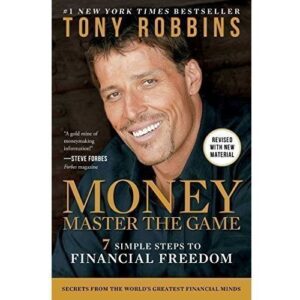
Tony Robbins is an international entrepreneur, #1 New York Times bestselling author, and philanthropist. Worth magazine recognized Robbins as one of the top 100 most influential people in global finance for two consecutive years. Accenture honoured Robbins as one of the “Top 50 Business Intellectuals in the World.” Robbins is a leader called upon by leaders: He’s consulted and coached some of the world’s greatest athletes, entertainers, Fortune 500 CEOs, and four US presidents.
In this comprehensive guide to financial freedom, Robbins interviews some of the world’s top investors and shares their strategies for building wealth. From asset allocation to risk management, “MONEY Master the Game” offers valuable insights and practical advice for investors of all levels.
This book Is financial education for the common man. This book is packed to-the-gills with things no one tells you.
11, “The Success Principles” by Jack Canfield
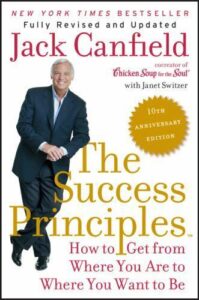
The Success Principles™ will teach you how to increase your confidence, tackle daily challenges, live with passion and purpose, and realize all your ambitions. Not merely a collection of good ideas, this book spells out the 64 timeless principles used by successful men and women throughout history.
Drawing on his own experiences and those of others, Canfield outlines 64 principles for achieving success in all areas of life. From goal-setting and time management to personal development and leadership, “The Success Principles” offers a comprehensive roadmap for achieving your dreams.
Jack Canfield (born August 19, 1944) is an American author and motivational speaker. He is the co-author of the Chicken Soup for the Soul series, which has more than 250 titles and 500 million copies in print in over 40 languages. In 2005 Canfield co-authored with Janet Switzer The Success Principles: How to Get From Where You Are to Where You Want to Be.
10, “The Compound Effect” by Darren Hardy
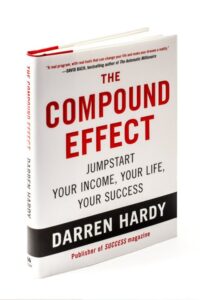
The One Thing: The Surprisingly Simple Truth Behind Extraordinary Results (stylized The ONE Thing) is a non-fiction self-help book written by authors and real estate entrepreneurs Gary W. Keller and Jay Papasan. The book discusses the value of simplifying one’s workload by focusing on the one most important task in any given project.
The book has appeared on the bestseller lists of The New York Times, The Wall Street Journal, USA Today, and Amazon.com. It was first published by Bard Press on April 1, 2013. In “The One Thing,” Keller explores the power of focus and prioritization in achieving extraordinary results. By identifying the one thing that matters most and devoting all your energy to it, readers can unlock their full potential and achieve greater success in less time.
Jay Papasan is an American writer and business executive. He is best known for co-authoring, with Gary Keller, books such as The Millionaire Real Estate Investor, which both became a New York Times best-seller and a BusinessWeek best-seller and The ONE Thing, which reached #1 on the Wall Street Journal business best-seller list. Papasan is the vice president of publishing and executive editor at KellerINK, the publishing arm of Keller Williams Realty. He and his wife Wendy are owners of The Papasan Real Estate Team. In 2014 he was named one of the Most Powerful People in Real Estate by Swanepoel Power 200.
9, “Awaken the Giant Within” by Tony Robbins
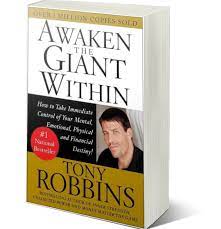
Anthony Robbins is an expert in the psychology of peak performance as well as personal, professional and organizational “turnaround.” He has, during his career, helped many professional athletes, sports teams, and business organizations. He was a consultant to the 1992 America’s Cup Winner, America 3; the 1993 Stanley Cup contenders, Los Angeles Kings; the 1994 U.S. Open Champion, Andre Agassi; as well as companies that include Hallmark, South-western Bell and the U.S. Army.
He has been an advisor to two royal families and was named the primary consultant in the regeneration of Sheffield, a city in England. Robbin’s published works include “Unlimited Power,” “Awaken the Giant Within,” “Notes From a Friend,” and “Giant Steps.” He also produced an audio series on personal development called Personal Power.
In this empowering book, Robbins shares his strategies for personal and professional success. Through practical exercises and techniques, he helps readers tap into their inner power, overcome obstacles, and achieve their goals.
If you have a fear of public speaking and when called upon me to speak to a group, you are petrified, this book will help. After following Tony’s advice, using swish patterns and installing anchors, the fear will be gone and you will be complimented me on your performance. It doesn’t take weeks, it takes one application. You will be able to flatten my fears, overcome lifelong phobias e.g. fear of snakes and public speaking. You will make rapid and permanent changes. Awaken The Giant is a great book. It will unleash the giant sleeping inside of you and help you reach whatever goals you can realistically set and go for.
8, “The Power of Now” by Eckhart Tolle
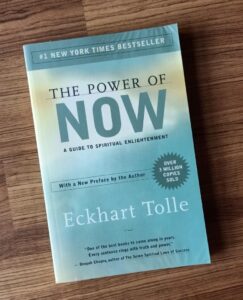
Eckhart Tolle born Ulrich Leonard Tölle, 16 February 1948) is a German-born spiritual teacher and self-help author. His books include The Power of Now: A Guide to Spiritual Enlightenment (1997), A New Earth: Awakening to Your Life’s Purpose (2005) and the picture book Guardians of Being (2009).
Tolle came to prominence as a self-help author in the U.S. and internationally beginning in 2000, after Oprah Winfrey promoted his books in 2000 and 2005 and created webinars for him in 2008.
This book by Eckhart Tolle. It presents itself as a discussion about how people interact with themselves and others. The concept of self reflection and presence in the moment are presented along with simple exercises for the achievement of its principles. Published in the late 1990s, the book was recommended by Oprah Winfrey and has been translated into 33 languages. As of 2009, it was estimated that three million copies had been sold in North America.
While not strictly a book on wealth and success, “The Power of Now” offers profound insights into the nature of consciousness and the importance of living in the present moment. By cultivating mindfulness and awareness, readers can unlock their full potential and achieve greater success in all areas of life.
7, “Secrets of the Millionaire Mind” by T. Harv Eker

Using the principles he teaches, T. Harv Eker went from zero to millionaire in only two and a half years, and went on to build one of the largest success training companies in North America. With his unique brand of “street smarts with heart,” Eker’s humorous, “cut-to-the-chase” style keeps his audience spellbound. People come from all over the world to attend his sold-out seminars, where crowds often exceed 2,000 people for a weekend program. So far, Eker’s teachings have touched the lives of over a million people. Now, for the first time, he shares his proven secrets of success in this revolutionary book. Read it and grow rich!
In “Secrets of the Millionaire Mind,” Eker explores the mind set and beliefs that separate the wealthy from the rest. Through practical exercises and insights, he helps readers identify and overcome limiting beliefs and adopt the mind set of abundance.
Mastering the Inner Game of Wealth. Have you ever wondered why some people seem to achieve wealth effortlessly while others work just as hard but still struggle financially? In this fresh and original book T. Harv Eker explains how you too can master the inner game of money so that you will not only achieve financial success but keep it once you have it. Using breakthrough techniques T. Harv Eker shows you how childhood and family experiences and inner mental attitudes shape your view of money.
https://www.amazon.com/Power-Now-Guide-Spiritual-Enlightenment/dp/1577314808
6, “The Wealthy Barber” by David Chilton
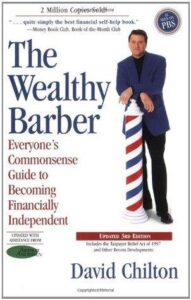
David Chilton is a Canadian born author, investor, and television personality from Waterloo, Ontario. He appeared on television in the Canadian version of Dragons’ Den.
The Wealthy Barber (full title: The Wealthy Barber: The Common Sense Guide to Successful Financial Planning) is a financial planning book franchise by Canadian author David Chilton. The first book in the series was in the business fable genre, using the story of fictional characters to convey financial advice.
Written in the form of a story, “The Wealthy Barber” offers practical financial advice in a simple and accessible format. With its timeless lessons on saving, investing, and planning for the future, it’s a must-read for anyone looking to build long-term wealth.
5, “The 4-Hour Workweek” by Timothy Ferriss
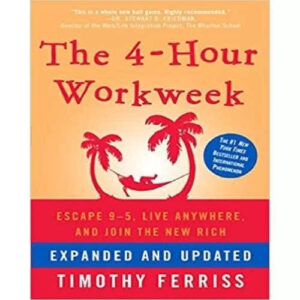
The 4-Hour Workweek: Escape 9–5, Live Anywhere, and Join the New Rich (2007) is a self-help book by Timothy Ferriss, an American writer, educational activist, and entrepreneur. It deals with what Ferriss refers to as “lifestyle design”, and repudiates the traditional “deferred” life plan in which people work gruelling hours and take few vacations for decades and save money in order to relax after retirement. The book spent four years on The New York Times Best Seller List, was translated into 40 languages, and sold around 2.1 million copies.
In this revolutionary book, Ferriss challenges the traditional notion of work and introduces readers to the concept of lifestyle design. Through practical tips and strategies, he shows how to maximize productivity, minimize workload, and create a life of freedom and abundance.
Forget the old concept of retirement and the rest of the deferred-life plan–there is no need to wait and every reason not to, especially in unpredictable economic times. Whether your dream is escaping the rat race, experiencing high-end world travel, or earning a monthly five-figure income with zero management, The 4-Hour Workweek is the blueprint.
This step-by-step guide to luxury lifestyle design teaches:
• How Tim went from $40,000 per year and 80 hours per week to $40,000 per month and 4 hours per week
• How to outsource your life to overseas virtual assistants for $5 per hour and do whatever you want
• How blue-chip escape artists travel the world without quitting their jobs
• How to eliminate 50% of your work in 48 hours using the principles of a forgotten Italian economist
• How to trade a long-haul career for short work bursts and frequent “mini-retirements”
4, “The Millionaire Next Door” by Thomas J. Stanley and William D. Danko

The Millionaire Next Door: The Surprising Secrets of America’s Wealthy is a 1996 book by Thomas J. Stanley and William D. Danko. The book is a compilation of research done by the two authors in the profiles of American millionaires.
The authors compare the behaviour of those they call “UAWs” (Under Accumulators of Wealth) and those who are “PAWs” (Prodigious Accumulators of Wealth). Their findings, that millionaires are disproportionately clustered in middle-class and blue-collar neighborhoods and not in more affluent or white-collar communities, came as a surprise to the authors who anticipated the contrary. Stanley and Danko’s book explains why, noting that high-income white-collar professionals are more likely to devote their income to luxury goods or status items, thus neglecting savings and investments.
Thomas J. Stanley was born in 1944 in the Bronx, New York City. He went to college in Connecticut, did graduate work at the University of Tennessee, and received a doctorate at the University of Georgia. He was a marketing professor at Georgia State University, a public speaker, a consultant on selling to the rich, and an author. He wrote books on the habits of millionaires including The Millionaire Next Door and The Millionaire Mind. He died in a car accident on February 28, 2015 at the age of 71.
Based on extensive research, “The Millionaire Next Door” explores the habits and behaviours of America’s wealthy elite. The book challenges common misconceptions about wealth and offers practical advice for building and maintaining financial independence.
3, “The Richest Man in Babylon” by George S. Caslon
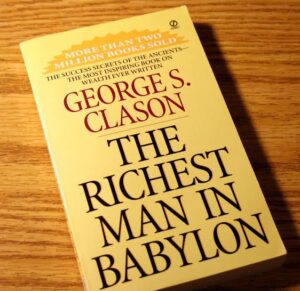
The Richest Man in Babylon is a 1926 book by George S. Clason that dispenses financial advice through a collection of parables set 4,097 years earlier, in ancient Babylon. The book remains in print almost a century after the parables were originally published, and is regarded as a classic of personal financial advice.
This book deals with the personal successes of each of us. Success means accomplishments as the result of our own efforts and abilities. Proper preparation is the key to our success. Our acts can be no wiser than our thoughts. Our thinking can be no wiser than our understanding. This book of cures for lean purses has been termed a guide to financial understanding. That, indeed, is its purpose: to offer those who are ambitious for financial success an insight which will aid them to acquire money, to keep money and to make their surpluses earn more money.
This book deals with the personal successes of each of us. Success means accomplishments as the result of our own efforts and abilities. Proper preparation is the key to our success. Our acts can be no wiser than our thoughts. Our thinking can be no wiser than our understanding. This book of cures for lean purses has been termed a guide to financial understanding. That, indeed, is its purpose: to offer those who are ambitious for financial success an insight which will aid them to acquire money, to keep money and to make their surpluses earn more money.
Set in ancient Babylon, this timeless classic offers timeless wisdom on the principles of wealth-building and financial success. Through parables and stories, Caslon teaches readers the importance of saving, investing, and living below their means.
2, “Rich Dad Poor Dad” by Robert T. Kiyosaki
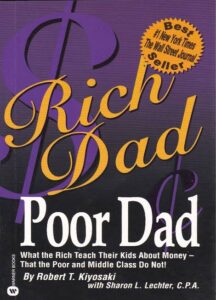
Rich Dad Poor Dad is a 1997 book written by Robert T. Kiyosaki and Sharon Lechter. It advocates the importance of financial literacy (financial education), financial independence and building wealth through investing in assets, real estate investing, starting and owning businesses, as well as increasing one’s financial intelligence (financial IQ).
Rich Dad Poor Dad is written in the style of a set of parables based on Kiyosaki’s life. The titular “rich dad” is his best friend’s father who accumulated wealth due to entrepreneurship and savvy investing, while the “poor dad” is claimed to be Kiyosaki’s own father who he says worked hard all his life but never obtained financial security.
The existence of Kiyosaki’s “Rich Dad” remains unproven, and there is no documentation on Kiyosaki’s alleged vast reserves of wealth earned before Rich Dad Poor Dad was published.
In this ground breaking book, Kiyosaki shares the lessons he learned from his “rich dad” and “poor dad” about money, investing, and building wealth. With its simple yet powerful principles, “Rich Dad Poor Dad” has become a must-read for anyone seeking financial independence.
1, THINK AND GROW RICH BY NAPOLEON HILL
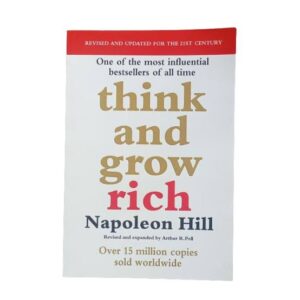
The book which was written by Napoleon Hill an American self-help author and conman, born on the 26th of October 1883 and died on the 8th of November 1970. Considered a classic in the field of personal development, “Think and Grow Rich” explores the mind set and strategies of successful individuals and offers practical techniques for achieving financial abundance. The book which was published in 1937 and became a major commercial success
Think and Grow Rich condenses them, providing the reader with 14 principles in the form of a “Philosophy of Achievement”. The 13 steps to riches, as outlined in “Think and Grow Rich” by Napoleon Hill, are:
1. Desire: Start with a strong desire or burning ambition to achieve a specific goal or outcome.
2. Faith: Have unwavering faith in yourself and your ability to achieve your goal.
3. Autosuggestion: Use positive self-talk and affirmations to reinforce your beliefs and goals.
4. Specialized knowledge: Acquire the knowledge and skills needed to achieve your goal.
5. Imagination: Use your imagination to visualize your goal and see yourself achieving it.
6. Organized planning: Develop a detailed plan of action to achieve your goal.
7. Decision: Make a firm decision to follow through on your plan and never give up.
8. Persistence: Keep working towards your goal, even when faced with obstacles or setbacks.
9. Power of the Master Mind: Surround yourself with like-minded people who support and encourage you.
10. The Mystery of Sex Transmutation: Use the power of your sexual energy to fuel your desire and drive.
11. The Subconscious Mind: Tap into the power of your subconscious mind to help you achieve your goals.
12. The Brain: Use your brain to analyze and plan, and to make decisions and take action.
13. The Sixth Sense: Trust your intuition and inner guidance to help you make the right decisions and achieve your goals.
With these top 20 books on wealth and success, readers have access to a wealth of knowledge, inspiration, and practical advice to help them achieve their goals and create a life of abundance. Whether you’re an aspiring entrepreneur, a seasoned professional, or simply someone looking to improve your financial situation, these books offer valuable insights and guidance to help you on your journey to success.


